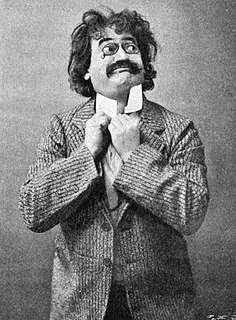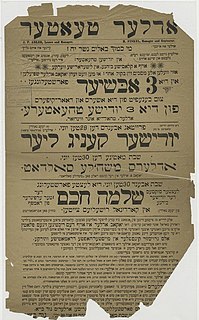Related Research Articles

The East Village is a neighborhood on the East Side of Lower Manhattan in New York City. It is roughly defined as the area east of the Bowery and Third Avenue, between 14th Street on the north and Houston Street on the south. The East Village contains three subsections: Alphabet City, in reference to the single-letter-named avenues that are located to the east of First Avenue; Little Ukraine, near Second Avenue and 6th and 7th Streets; and the Bowery, located around the street of the same name.

Yiddish theatre consists of plays written and performed primarily by Jews in Yiddish, the language of the Central European Ashkenazi Jewish community. The range of Yiddish theatre is broad: operetta, musical comedy, and satiric or nostalgic revues; melodrama; naturalist drama; expressionist and modernist plays. At its height, its geographical scope was comparably broad: from the late 19th century until just before World War II, professional Yiddish theatre could be found throughout the heavily Jewish areas of Eastern and East Central Europe, but also in Berlin, London, Paris, Buenos Aires and New York City.

Abraham Goldfaden was a Russian-born Jewish poet, playwright, stage director and actor in the languages Yiddish and Hebrew, author of some 40 plays. Goldfaden is considered the father of modern Jewish theatre.

Jacob Pavlovich Adler was a Jewish actor and star of Yiddish theater, first in Odessa, and later in London and in New York City's Yiddish Theater District.

Boris Thomashefsky was a Ukrainian-born Jewish singer and actor who became one of the biggest stars in Yiddish theatre.

Sigmund Mogulesko — Yiddish: זעליק מאָגולעסקאָZelik Mogulesko, first name also sometimes spelled as Zigmund, Siegmund, Zelig, or Selig, last name sometimes spelled Mogulescu — was a singer, actor, and composer in the Yiddish theater in New York City. He was born in Kalarash, Bessarabia and began singing in the local synagogue choir. Before reaching adolescence, he was paid nearly three times what teachers made, to sing in the synagogue of Chişinău. Soon after moving to Bucharest, Romania, he was paid to sing in churches as well as synagogues, and started acting.

Moses Ha-Levi Horowitz, also known as Moishe Hurvitz, Moishe Isaac Halevy-Hurvitz, etc., was a playwright and actor in the early years of Yiddish theater. Jacob Adler describes him as an "authorit[y] on dramaturgy", but also remarks that before being part of the Yiddish theater in London in the mid-1880s he had "wandered in different lands, involved himself in various undertakings, and then moved on often leaving, it is said not altogether pleasant memories behind him." He was one of the few figures in the early years of Yiddish theater who did not participate in the boom years in Imperial Russia (1879–1883).

Philip "Fyvush" Finkel was an American actor known as a star of Yiddish theater and for his role as lawyer Douglas Wambaugh on the television series Picket Fences, for which he earned an Emmy Award for Outstanding Supporting Actor in a Drama Series in 1994. He is also known for his portrayal of Harvey Lipschultz, a crotchety history teacher, on the television series Boston Public.

David Kessler was a prominent actor in the first great era of Yiddish theater. As a star Yiddish dramatic performer in New York City, he was the first leading man in Yiddish theater to dispense with incidental music.
Harry Steppe, March 16, 1888 – November 22, 1934 was a Russian Jewish-American actor, musical comedy performer, headliner comedian, writer, librettist, director and producer, who toured North America working in Vaudeville and Burlesque. Steppe performed at several well-known theaters on the Columbia, Mutual and Orpheum circuits. Steppe was one of Bud Abbott's first partners.

George Washington Lafayette Fox was an American actor and dancer who became known for his Clown roles and who based the characterisations for these roles on his inspiration Joseph Grimaldi.

Maurice Schwartz, born Avram Moishe Schwartz, born in the Volhynia province of Ukraine, was a stage and film actor active in the United States. He founded the Yiddish Art Theatre and its associated school in 1918 in New York City and was its theatrical producer and director. He also worked in Hollywood, mostly as an actor in silent films but also as a film director, producer, and screenwriter.

Mount Hebron is a Jewish cemetery located in Flushing, Queens, New York City. It was founded in 1903 as the Jewish section of Cedar Grove Cemetery, and occupies the vast majority of the grounds at Cedar Grove. The cemetery is on the former Spring Hill estate of colonial governor Cadwallader Colden. It is noted for its Yiddish theater section. About 217,000 people have been buried in Mount Hebron since it opened.

Washington Cemetery is an historical and predominantly Jewish burial ground located at 5400 Bay Parkway in Mapleton, Brooklyn, New York, United States.

Rudolph Schildkraut (27 April 1862 – 15 July 1930) was an Austrian film and theatre actor.

The Grand Theatre was a theatre in the Yiddish Theatre District in Manhattan in New York City built for Yiddish productions, the first of its kind. The theater was built in 1904 by Jacob Pavlovitch Adler, a famous Russian-born Jewish actor.

The Irving Place Theatre was located at the southwest corner of Irving Place and East 15th Street in the Union Square neighborhood of Manhattan, New York City. Built in 1888, it served as a German language theatre, a Yiddish theatre, a burlesque house, a union meeting hall, a legitimate theatre and a movie theatre. It was demolished in 1984.

The Yiddish Theatre District, also called the Jewish Rialto and the Yiddish Realto, was the center of New York City's Yiddish theatre scene in the early 20th century. It was located primarily on Second Avenue, though it extended to Avenue B, between Houston Street and East 14th Street in the East Village in Manhattan. The District hosted performances in Yiddish of Jewish, Shakespearean, classic, and original plays, comedies, operettas, and dramas, as well as vaudeville, burlesque, and musical shows.

Jacob Ben-Ami was a noted Belarusian-born Jewish stage actor who performed equally well in Yiddish and English.

Miner's Bowery Theatre was a vaudeville or variety show theater opened in the Bowery of New York by Senator Henry Clay Miner in 1878. The theater was known for its method of encouraging anyone to get on stage and perform on amateur nights, and for its method of removing bad performers from the stage by yanking them off with a wooden hook. Starting in the 1890s, a stage-prop shepherd's hook was used to pull bad performers bodily from the stage, after audience members shouted, "Give 'im the hook." The phrase, "Give him the hook" originated at Miners Bowery Theatre.
References
- 1 2 3 4 5 6 "Rudolph Rodkinson, Lawyer, Dies at 63". The Brooklyn Daily Eagle. 7 May 1930. p. 12. Retrieved 9 January 2019.
- 1 2 3 "Picture and Name His Own". The World. New York, New York. 30 December 1893. p. 9. Retrieved 9 January 2019.
- 1 2 "Hot Weather Entertainments - The Standard". The Philadelphia Inquirer. 11 June 1893. p. 11. Retrieved 9 January 2019.
- ↑ "Effort Toward Yiddish Theater". The Chicago Tribune. 21 March 1901. p. 7. Retrieved 9 January 2019.
- ↑ "In the Theatres - Park Theatre". The Bridgeport Times and Evening Farmer. Bridgeport, Connecticut. 2 March 1911. p. 5. Retrieved 9 January 2019.
- ↑ "Prager Operetta Company To-night". The Courier-Journal. Louisville, Kentucky. 25 January 1912. p. 6. Retrieved 9 January 2019.
- ↑ "Value of Mrs. Eisenhofer". The Sun. New York, New York. 27 July 1903. p. 14. Retrieved 9 January 2019.
- Adler, Jacob, A Life on the Stage: A Memoir, translated and with commentary by Lulla Rosenfeld, Knopf, New York, 1999, ISBN 0-679-41351-0. 261.
| | This article about an American playwright is a stub. You can help Wikipedia by expanding it. |